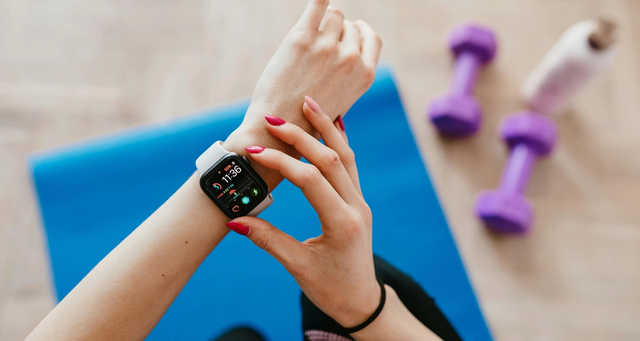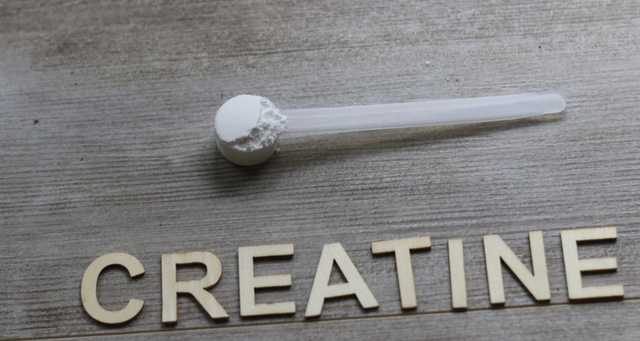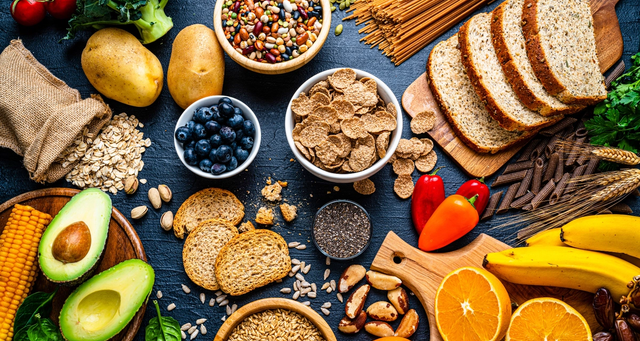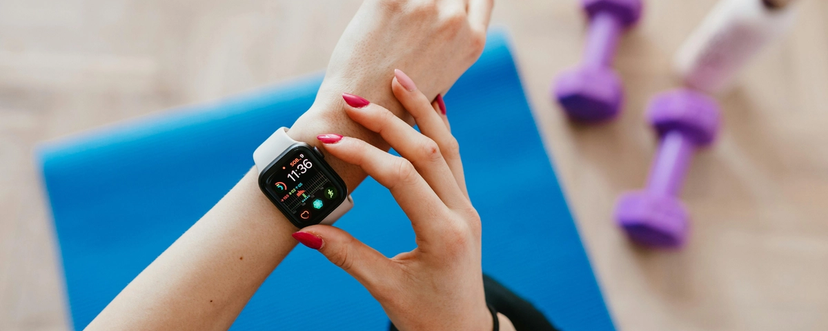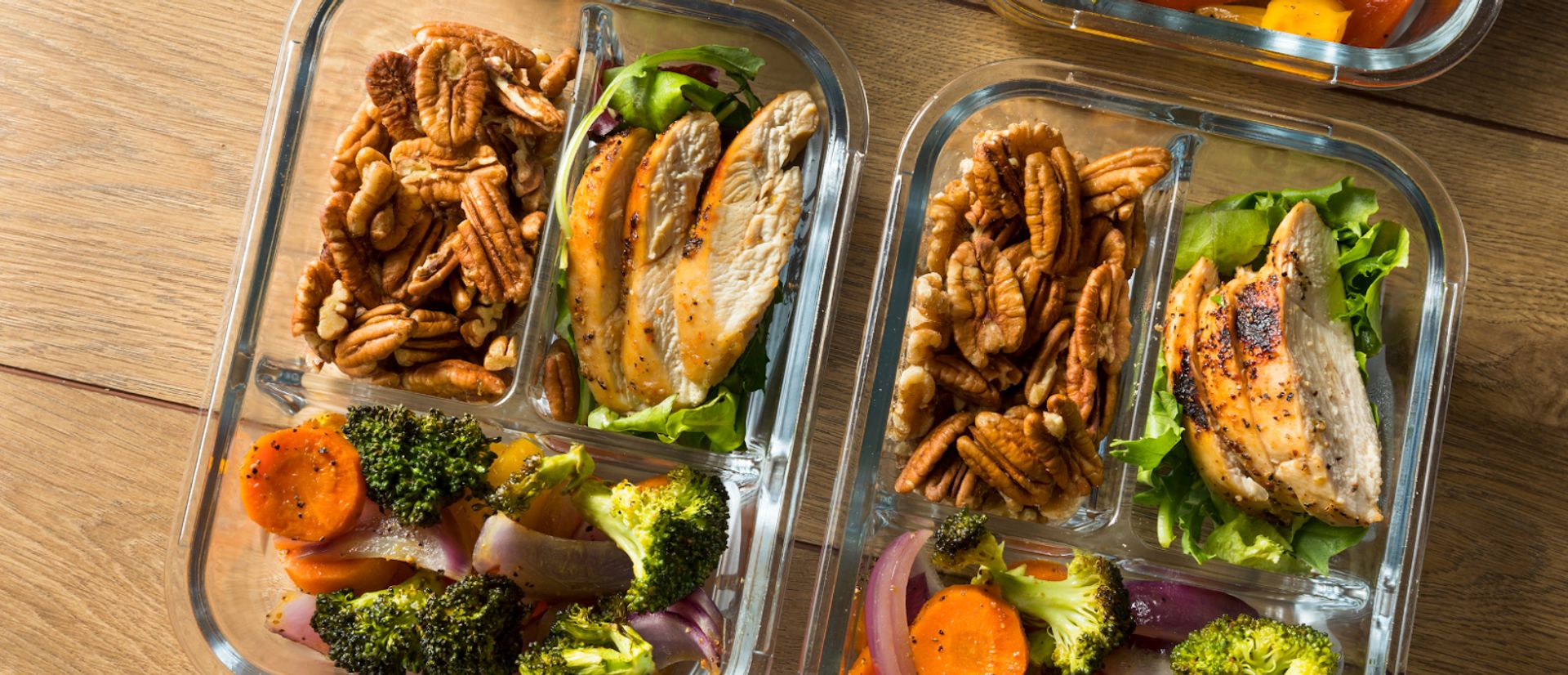
Our Trainers' Top Bodybuilding Meal Prep Recipes
Serious about your gains? These bodybuilding meal prep recipes make it easy to hit your macros, fuel your workouts, and stay on track.
Training is essential, but it’s the food on your plate that powers real muscle growth. Your body needs consistent fuel to recover, grow, and perform. And no amount of time under a barbell can make up for a poorly planned diet.
That’s why smart food and nutrition meal planning is a major part of bodybuilding. If you’re bulking, what and how you eat plays a direct role in whether you gain lean muscle or pack on unnecessary fat.
In this guide, we’ll explore how to calculate your bulking macros, understand the difference between clean and dirty bulking, and share some delicious recipes that’ll up your gains.
How to Crunch the Numbers: Calories and Macros for Bulking

To build muscle, you need to eat in a calorie surplus or take in more energy than you burn.
Start by calculating your Total Daily Energy Expenditure (TDEE). You can use a TDEE calculator online or estimate using your weight, activity level, and age. Once you have your number, add 250 to 500 extra calories a day. That buffer supports steady muscle growth without excessive fat gain.
But it has to be the right kind of energy. This is where micronutrients come in.
Macronutrients for Bulking
Before jumping into the specific numbers, it's important to understand that macronutrient needs vary based on your training style, metabolism, and how aggressively you want to bulk.
The following micronutrient ranges give you an idea of how much you need to be eating for bulking:
- Protein: 1 to 1.2 grams per pound of body weight
- Carbs: 2 to 2.5 grams per pound of body weight
- Fat: Around 0.4 to 0.5 grams per pound of body weight.
Macronutrients for Cutting
Now, if you’re ready to start cutting to show off your hard-earned gains, macronutrients are even more critical.
Typically, the rule of thumb is you can’t completely control what type of weight you lose, especially if you’re an intermediate or advanced lifter. Carbs, fats, and, of course, protein help preserve muscle while you cut and maintain your overall health.
Here’s an idea of what your macros should look like:
- Protein: 1.0 to 1.2 grams per pound of body weight
- Carbohydrates: 1.0 to 1.5 grams per pound of body weight
- Fats: Approximately 0.3 to 0.4 grams per pound of body weight
Sometimes, people like even higher protein intakes to err on the side of caution. After all, you worked hard to build that muscle. Just be careful not to overdo it, as protein can be hard on your liver and kidneys.
Clean Bulk vs. Dirty Bulk

Once your calorie and macro goals are set, it’s time to decide how you’ll reach them. Do you focus on quality ingredients or aim purely for numbers? The difference between clean and dirty bulking affects how you feel, how you perform, and how much of that weight gain is muscle.
Clean Bulking
Clean bulking focuses on whole foods and steady progress.
Meals are built around lean proteins, complex carbohydrates, healthy fats, and micronutrient-rich vegetables. The pace might be slower, but it gives you more control over body composition, fewer energy crashes, and better digestion.
Clean bulking also makes food and nutrition meal planning more manageable over time because it's grounded in balance.
Dirty Bulking
Dirty bulking is about convenience and calorie volume.
It typically includes highly processed foods, sugary snacks, and fast food to hit a daily surplus without dedicated time in the kitchen. While this method helps you gain weight faster, it usually comes with extra body fat, inconsistent energy, and more time spent cutting later. Nutrition and meal planning tend to take a backseat, making it harder to sustain long-term.
When deciding how to bulk, think about what works for your body, your routine, and your goals. For our clients focused on bodybuilding training, we recommend a clean, structured approach with thoughtful meal planning and nutrition for the best overall results.
Meal Planning is the Ultimate Body Building Hack
It’s easy for life to get in the way, especially when it comes to healthy eating habits.
Meal prep is one of the simplest ways to stay consistent as you work towards your bodybuilding goals. Having meals ready to go means fewer last-minute choices and a lot less stress about what to eat. Plus, it becomes easier to support your workouts, recovery, and energy throughout the day.
Here are our expert nutritionists' top tips for meal planning:
- Cook proteins like chicken, turkey, or beef in bulk so you always have a base to build meals around.
- Prep your carbs ahead of time: quinoa, jasmine rice, and sweet potatoes keep well for days.
- Stock up on frozen vegetables to save time on preparation and enjoy a variety.
- Use individual containers to portion out meals for the week.
- Switch up herbs and sauces so meals don’t start feeling repetitive.
Meal planning and nutrition are all about making things easier on yourself during the week. A little prep upfront goes a long way in helping you stay on track.
Our Favorite Bodybuilding Meal Prep Recipes
These are some of our trainers' favorite recipes. They’re easy to make, taste great, and keep you on track.
Breakfast
High-Protein Overnight Oats

- ½ cup rolled oats
- 1 scoop whey protein
- 1 tbsp chia seeds
- ½ banana, sliced
- ¾ cup unsweetened almond milk
- Combine all ingredients in a jar, stir well, and refrigerate overnight
Approx. macros: 28g protein / 40g carbs / 10g fat
Turkey and Veggie Egg Muffins
- ½ lb ground turkey (cooked)
- 6 eggs
- 1 cup spinach
- ½ cup chopped bell peppers
- Pour into muffin tin and bake at 350°F for 20 minutes
Approx. macros (2 muffins): 22g protein / 4g carbs / 14g fat
Lunch
Ground Turkey with Jasmine Rice and Broccoli
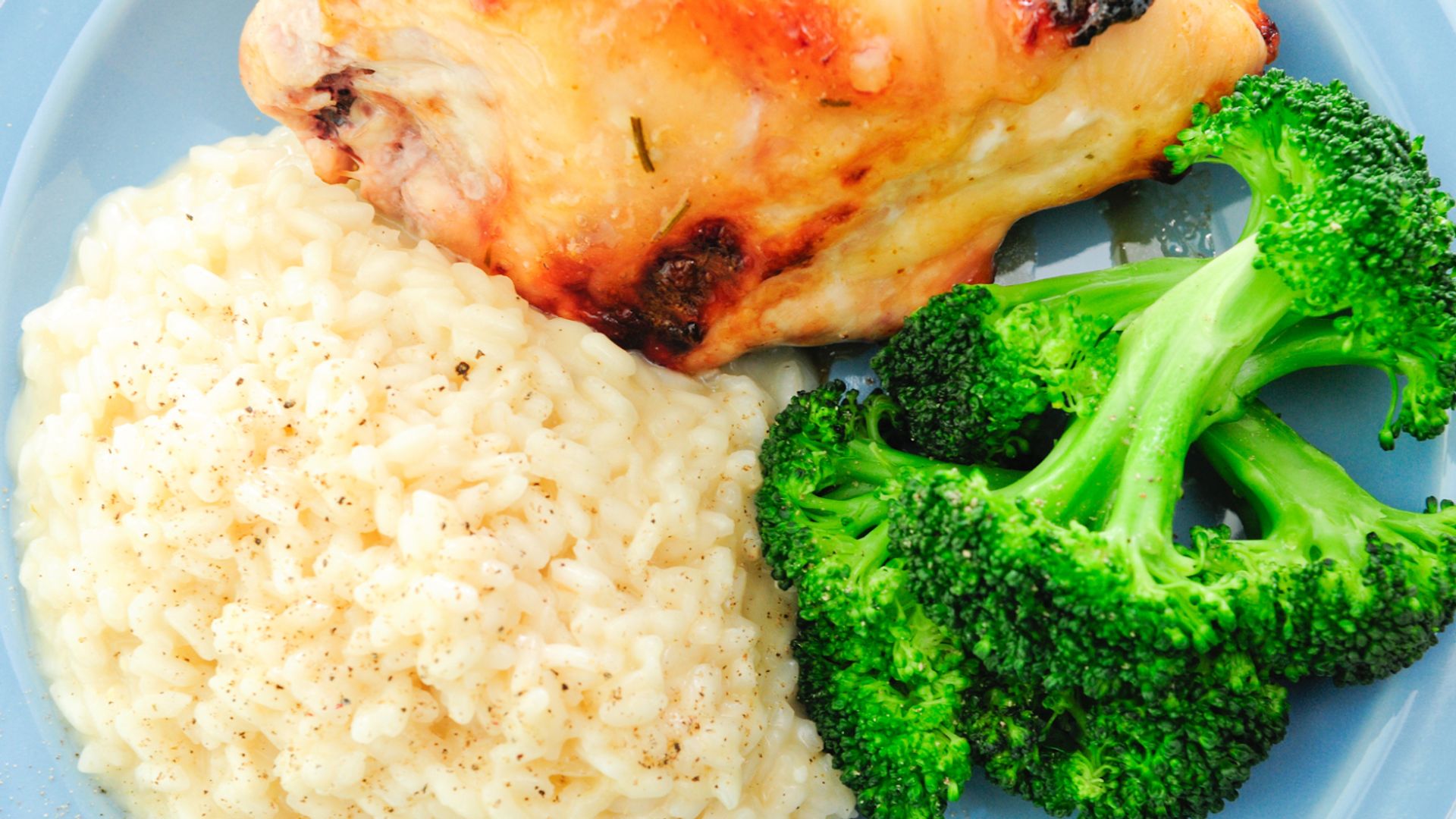
- 1 lb lean ground turkey
- 2 cups cooked jasmine rice
- 2 cups steamed broccoli
- Cook turkey with garlic and paprika
Approx. macros (per serving): 35g protein / 45g carbs / 12g fat
Grilled Chicken Thighs with Sweet Potato and Green Beans
- 4 boneless chicken thighs
- 2 medium sweet potatoes (roasted)
- 2 cups green beans (steamed or roasted)
- Season chicken with olive oil, rosemary, and black pepper
- Grill or bake until cooked through
Approx. macros (per serving): 30g protein / 35g carbs / 15g fat
Dinner
Salmon with Quinoa and Asparagus

- 2 salmon fillets (about 5 oz each)
- 1 cup cooked quinoa
- 1 bunch asparagus, trimmed
- Season salmon with lemon and dill, bake at 375°F for 15 minutes
- Roast asparagus in olive oil
Approx. macros (per serving): 40g protein / 30g carbs / 18g fat
Beef Stir-Fry with Brown Rice and Peppers
- ½ lb lean beef strips (flank or sirloin)
- 1 cup cooked brown rice
- 1 cup sliced bell peppers
- Stir-fry beef and peppers in sesame oil with garlic and coconut aminos
Approx. macros (per serving): 36g protein / 38g carbs / 16g fat
Snacks
Greek Yogurt with Almond Butter and Honey

- ¾ cup plain Greek yogurt
- 1 tbsp almond butter
- 1 tsp honey
Approx. macros: 20g protein / 15g carbs / 10g fat
Protein Balls
- 1 cup rolled oats
- ½ cup peanut butter
- 1 scoop whey protein
- Mix, roll into 1-inch balls, and chill in fridge
Approx. macros (2 balls): 16g protein / 18g carbs / 12g fat
Hard-Boiled Eggs and an Apple
- 2 boiled eggs
- 1 medium apple
Approx. macros: 14g protein / 25g carbs / 10g fat
Vegan Bodybuilding Meal Prep Recipes
Who says vegans can’t build muscle? Our trainers have seen incredible bodybuilding results from vegan clients. These are some of their go-to meals: nutrient-dense, easy to prepare, and rich in plant-based protein.
Breakfast
Tofu Scramble with Spinach and Sweet Potato

- ½ block firm tofu (crumbled)
- 1 cup spinach
- ½ cup roasted sweet potatoes
- Cook with olive oil, turmeric, and garlic powder
Approx. macros: 20g protein / 25g carbs / 14g fat
Chia Protein Pudding
- 3 tbsp chia seeds
- 1 scoop vegan protein powder
- ¾ cup almond milk
- ½ banana (sliced)
- Stir and chill overnight
Approx. macros: 22g protein / 30g carbs / 10g fat
Lunch
Lentil and Quinoa Power Bowl
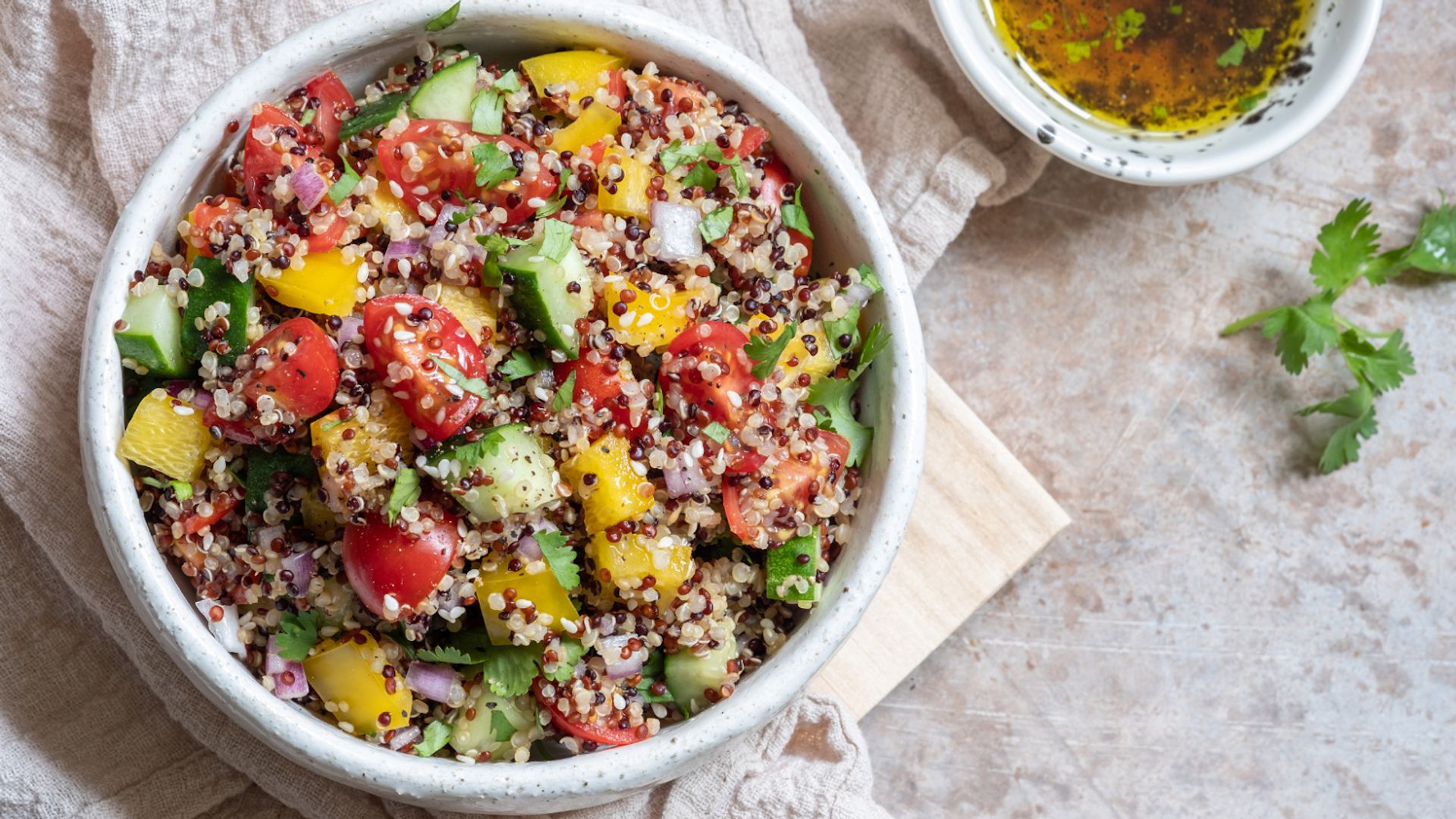
- ¾ cup cooked lentils
- ½ cup quinoa
- 1 cup roasted vegetables (carrot, zucchini, bell pepper)
- Drizzle with tahini and lemon juice
Approx. macros: 28g protein / 42g carbs / 12g fat
Chickpea and Avocado Wrap
- 1 whole grain wrap
- ½ avocado
- ¾ cup mashed chickpeas
- Add spinach and shredded carrots
Approx. macros: 20g protein / 35g carbs / 15g fat
Dinner
Tempeh Stir-Fry with Brown Rice

- ½ block tempeh (cubed)
- 1 cup brown rice
- 1 cup stir-fried vegetables (broccoli, snow peas, bell pepper)
- Cook in sesame oil with low-sodium soy sauce
Approx. macros: 32g protein / 45g carbs / 14g fat
Black Bean Chili
- 1 cup black beans
- ½ cup corn
- ½ cup diced tomatoes
- Spices: cumin, paprika, chili powder
- Simmer for 20 minutes, serve with brown rice if desired
Approx. macros: 25g protein / 40g carbs / 8g fat
Snacks
Edamame and Berries
- 1 cup edamame (steamed)
- ½ cup blueberries
Approx. macros: 18g protein / 14g carbs / 5g fat
Vegan Protein Shake
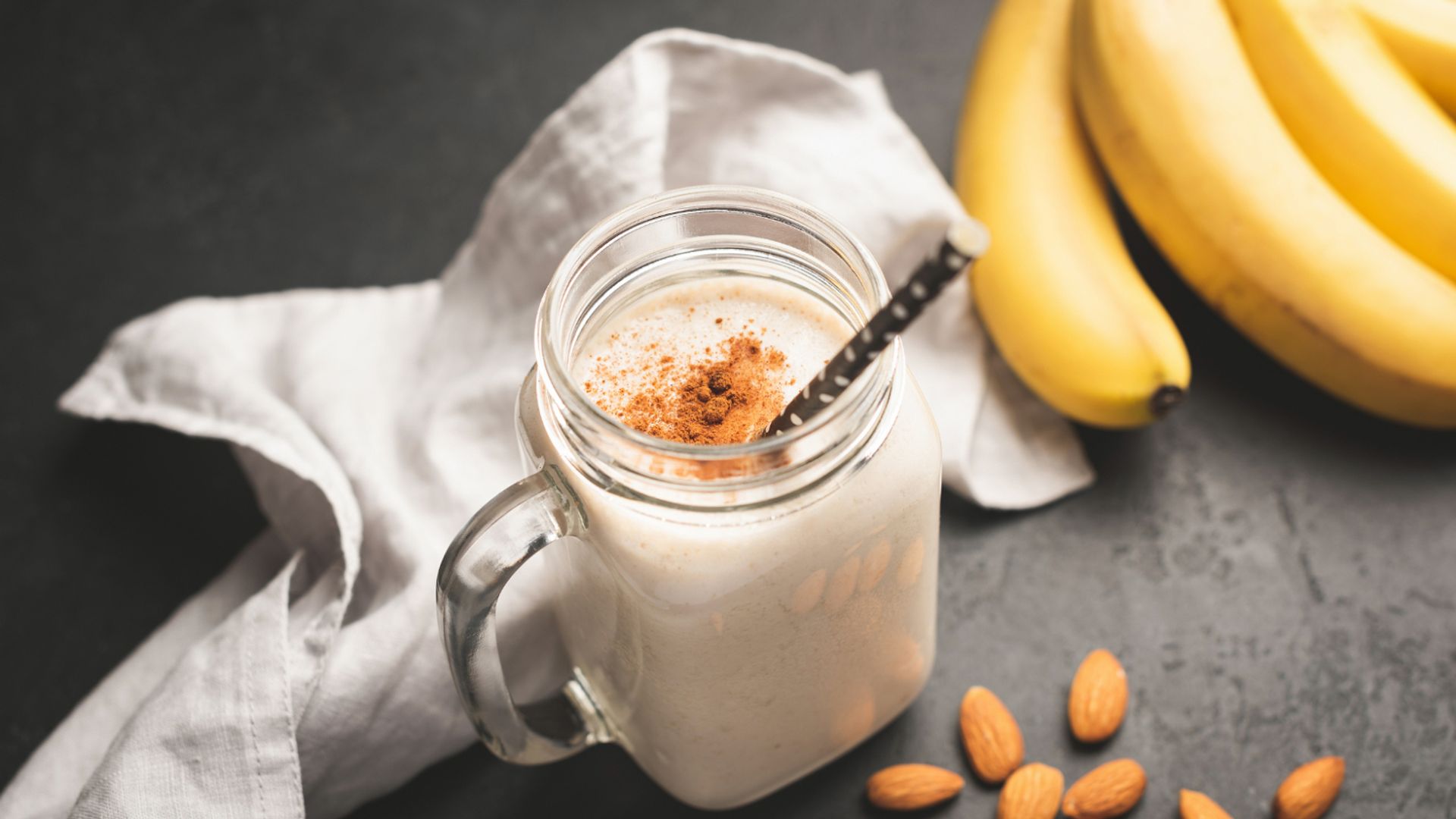
- 1 scoop vegan protein
- 1 cup almond milk
- 1 tbsp peanut butter
- ½ banana
- Blend and chill
Approx. macros: 24g protein / 20g carbs / 12g fat
Roasted Chickpeas
- 1 cup canned chickpeas (rinsed and roasted)
- Olive oil, sea salt, and smoked paprika
Approx. macros: 16g protein / 30g carbs / 8g fat
Meal Prep Mistakes to Watch Out For
While meal prepping is pretty straightforward, it's easy to lose momentum. These are the most common meal prep slip-ups we see and how to avoid them:
Not Tracking Portions Accurately
Even clean bulking can lead to extra fat gain if you're not paying attention to portion size. Grab a scale or use measuring cups so you know exactly how much you’re eating. You’ll be surprised how easy it is to overestimate your macros and underestimate your calories.
Over-Relying on Supplements
Supplements can be useful, especially when you’re on a cut. But they don’t replace real food. Treat them as a backup, not your main source of nutrition. Also, be sure you’re taking clean supplements from reputable brands.
Skipping Meals or Underestimating Hunger
Missing meals makes it harder to hit your calorie goals. Stay consistent with your schedule, even on rest days. Just because you’re taking a break doesn’t mean your muscles are. Make sure your body has what it needs to grow.
Expert Guidance That Makes Nutrition Stick
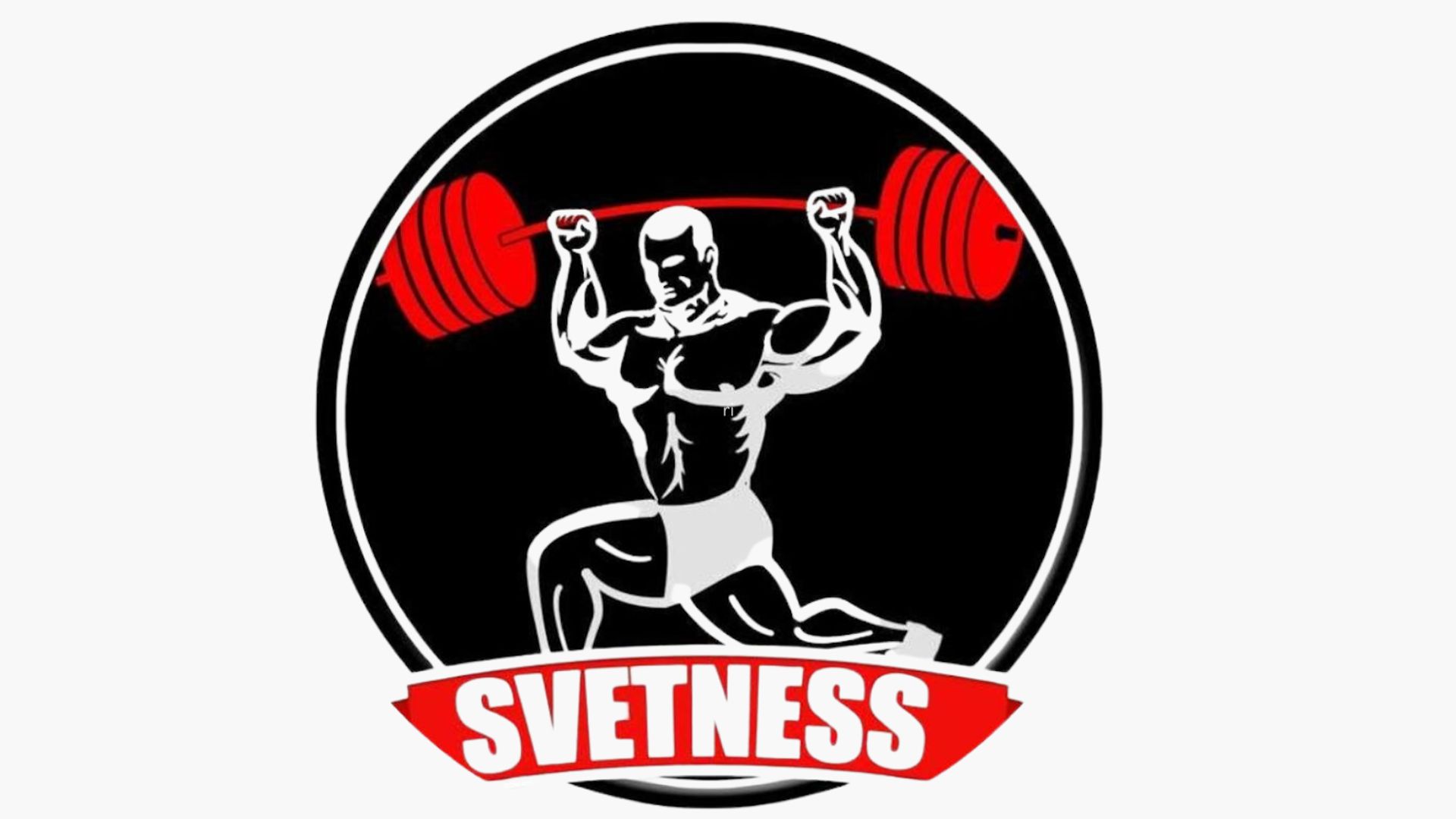
Svetness in-home personal trainers are here to support you at every stage of your bodybuilding journey, including meal prep, muscle building, and fat cutting. Our experts are ready to support your goals, help you stay on track, and make bodybuilding feel doable, not overwhelming.
Built-In Support, Right at Home
With Svetness, your training experience starts with the right match. We pair you with a certified personal trainer who understands your goals, such as muscle growth, increased energy, or maintaining a consistent diet.
You don’t need a full home gym either. Your trainer brings the equipment, builds a plan around your space and schedule, and helps you stay focused and motivated.
Over time, that relationship becomes a real part of your routine. Svetness is about building a system that fits your life and keeps you moving forward.
Final Thoughts
If you're serious about building muscle, what you eat matters just as much as your exercises. Meal prep gives you the structure to stay on track and the fuel your body needs to recover and grow.
You don't have to be perfect (we're big fans of cheat days). Meal prep is about showing up, staying consistent, and giving yourself the best shot at progress. Start simple, stick with it, and let the results speak for themselves.
Ready to take your nutrition to the next level? Book a free consultation with one of our expert bodybuilding nutritionists.
Frequently Asked Questions
What is the 40-40-20 meal plan for bodybuilding?
It’s a macro breakdown where 40% of your daily calories come from protein, 40% from carbs, and 20% from fat. This approach helps support muscle growth and recovery while keeping energy steady.
What does a bodybuilder's meal plan look like?
It’s usually high in protein and carbs, with moderate fats. Most plans include 4 to 6 meals a day, built around whole foods like lean meats, eggs, rice, oats, and vegetables.
What should a beginner bodybuilder eat?
Stick to simple meals with lean protein, whole grains, and vegetables. Think chicken and rice, eggs and oats, or tofu and sweet potato. Start with whole foods before worrying about supplements.
Which vegetable is best for muscle gain?
Spinach is a great pick since it’s packed with iron and magnesium. Broccoli and sweet potatoes are also top choices for their fiber and nutrient content.
Start your Svetness journey today
Get a free consultation and see how our trainers can transform your wellness journey.
